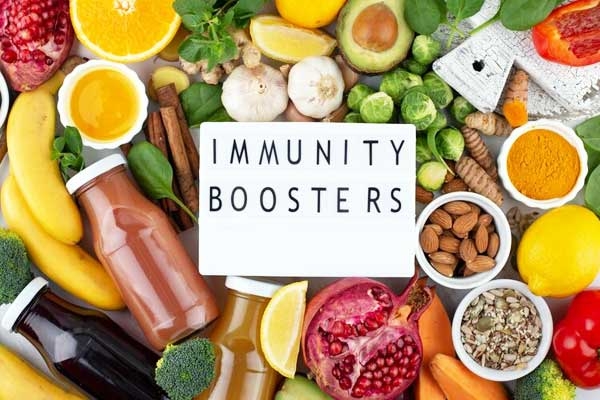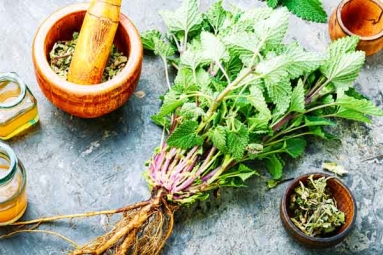
(Image source from: Freepik.com)
The immune system is like your body's personal arm, always on alert, protecting you from infections and diseases. Primarily, it fights infection, accelerates healing, and identifies and removes abnormal or damaged cells. Of course, a strong immune system is essential for overall health and survival. People who get sick often should do something to boost their immunity. Although there are many uncontrollable factors such as age and physical inactivity that can weaken your immune system, you can still take steps to strengthen your immune system. According to experts, our immune system is very complex. So there is no miracle cure or special medicine to solve the problem. In addition to getting your vaccinations on time, maintaining general health and living a healthy lifestyle can also help. This is an important step in building immunity against a variety of infections and diseases. Here are some tips to boost immunity:
1. Look at what's on your plate
Inflammation is an important part of the immune response, but it can also have devastating consequences for our bodies. It traps viruses and bacteria and helps heal tissues. However, when this inflammatory process is triggered by glucose and fat and occurs continuously, it can have negative health effects and lead to problems such as diabetes, liver disease and heart disease. Consuming refined carbohydrates (like flour), sugary drinks like cola, red meat, and fried foods are associated with increased levels of inflammation in the body. We recommend focusing on natural foods like vegetables and fruits. "Eating cookies, sweets or cakes occasionally won't harm your immune system, but honestly I don't feel good if you have more processed foods than whole foods like fruits and vegetables on your plate," says Maryam. Naslawecki, a New Brunswick registered dietitian with a background in biochemistry, said the report. . In a 2021 study, researchers at Harvard University found that people who ate a mostly plant-based diet had a lower risk of becoming infected with the coronavirus than people who ate the poorest diets with more nutrients and micronutrients need with increasing age.
2. Get out and walk
People who don't exercise or don't move around a lot have a weaker immune system. Conversely, moderate physical activity optimizes immune system function. In a 2018 study published by Duke University School of Medicine, inactive older adults with rheumatoid arthritis found that adding 30 minutes of exercise three times a week boosted immunity and lowered inflammation levels. Excessive physical activity, such as running a marathon, can disrupt the normal functioning of the immune system. You may want to exercise for 10 to 30 minutes every day. Or if you have a chronic illness, do what you can. Remember that every minute counts. Exercise, even for a short period of time, has more health benefits than doing nothing at all. Consider getting a walking partner or taking an online exercise class.
3. Stop drinking alcohol and ask for more water.
Everyone knows that alcohol is harmful to health. It also disrupts our immune system in many ways. If you drink too much alcohol, you risk pneumonia and other lung diseases. Infections and injuries also take longer to heal. Additionally, excessive alcohol consumption has been linked to increased inflammation in the body, which can further impair immune function. That is not all. Alcohol also disrupts the body's hydration, which is essential for absorbing nutrients and excreting waste products. Both processes are important for maintaining a healthy immune system. So stay away from alcohol. If you drink alcohol regularly, there are things you can do to keep your alcohol consumption under control. Drink slowly, drink a glass of water after each drink, or increase the amount of soda water (without sugar) in your drinks.
4. Keep calm!
Chronic stress is unhealthy and can weaken your immune system. A 2021 study from Western University found that stress hormones called glucocorticoids reduce the function of certain T cells (T cells are an important part of the immune system and help protect the body from infection and disease (and they can also "Fill your life with opportunities to move in a positive direction and escape your fears," says Steve Jordans, a professor at Scarborough College, University of Toronto. Make Tuesday Night a Comedy Night Digest: “Be grateful for everything in your life.”
5. Sleep well
A proper sleep schedule is essential for a strong immune system. Seven to eight hours of sleep reduces the risk of infections and chronic inflammation. In a study conducted at the Sunnybrook Research Institute in Toronto, older adults who had frequent sleep problems were given cognitive tests (assessing brain functions such as thinking, learning, memory and judgment). Unhealthy changes in infection-fighting immune cells (microglia) have also been observed. From the age of 55 onwards, sleep disorders usually occur because the circadian cycle (the body's internal clock) no longer works properly. Therefore, special efforts should be made to improve it. You should ensure that your bedroom is dark, quiet and clean. You can also take a warm shower before starting the day. Maintaining a sleep schedule is essential. “If you have an irregular sleep schedule, simply wake up at a certain time every day. Then at some point you want to go to bed at a reasonable time,” suggests Professor Jordans.
6. Grow your connections
Talk to your friends more often and maintain relationships. Did you know that positive social interactions help reduce chronic stress and reduce inflammation? On the other hand, loneliness negatively affects our health. A 2017 study found that isolated people experienced more severe symptoms when exposed to cold viruses. The disease could be difficult to treat and caused additional stress during confinement.
7. Following the morning sun
Exposure to sunlight in the morning not only improves your body's natural clock (which is good for better sleep and a stronger metabolism), but also helps your body produce vitamin D. . You can exercise and be a little more active on the road. That's not all. Contact with nature reduces stress and anxiety. So try to enjoy the morning sun. A weakened immune system can also be a sign of illness. Seek medical help if you get sick frequently, have recurring digestive problems, or new infections/problems occur before you have recovered from previous infections.







